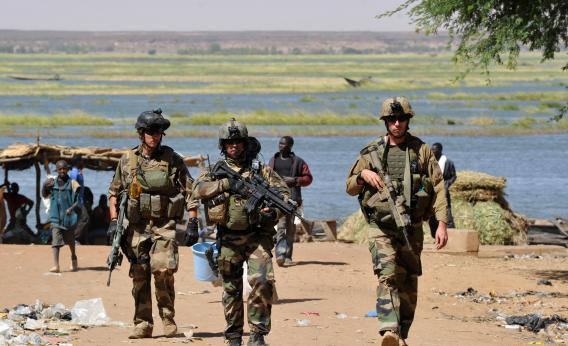French troops are currently planning a swift exit from Mali, but the local government’s battle with Islamist insurgents rages on. Meanwhile, the international community continues to ask itself what went wrong in a country once seen as a model for the region. But some climate analysts say they saw the civil war brewing—and, more importantly, that climate change could be an increasingly prominent factor in crises in the region.
There’s a lot of debate in the global security establishment about how much we can blame climate—let alone climate change—for conflict. On one side, there are thinkers like the team of Columbia and Princeton scientists who claim El Niño contributed to one-fifth of the world’s civil wars between 1950 and 2004. On the other, there are analysts like Lionel Beehner, a fellow at the Truman National Security Project, who published an influential article last year refuting such one-to-one relationships. To split the difference, climate-watchers prefer using terms like “threat multiplier” in cases like Mali’s.
In Mali, “a lot of the unrest is deep-seated,” says climate-security analyst Caitlin E. Werrell. For example, the Libyan war brought an influx of weapons and militants, and Tuareg separatists had long operated in the arid north.
But the north had been getting a whole lot more arid in recent years, thanks to factors like burning wood for fuel and greenhouse gas emissions from India and China. Much of Mali’s land is in the massive strip of land known as the Sahel, which was wracked by one of its increasingly severe droughts in the months leading up to last year’s coup d’état. As early as 2010, leading climate-aware observers began to warn of instability.
Francesco Femia, a founding director of the Center for Climate and Security, agrees with Werrell that there isn’t a straightforward cause-effect relationship here. “But when a government has a great deal of difficulty providing basic resources for its public,” he says, “and when climate-exacerbated droughts make that situation worse, then the staying power of non-state actors”—such as al-Qaida in the Islamic Maghreb—“and sympathy for non-state actors can rise.”
Right now, many of those ingredients are also being cooked up just a few hundred miles from the Malian border, in Africa’s most populous country.
“If I had to put money on it, I think we’re likely to see similar situations or more violence and instability in Nigeria,” said Nancy Brune, a senior fellow at the Center for a New American Security. The Nigerian government is in a growing fight with the Islamist militia known as Boko Haram, and she sees ongoing climate-related problems—like agricultural collapse and rural-to-urban migration—as major contributors to that conflict.
However, analysts aren’t without hope when it comes to areas prone to both Islamic extremism and climate change. Brune, Femia, and Werrell all call for local and international investment in “climate resilience” projects—for example, housing for internally displaced farmers or green-energy alternatives to burning wood.
“It’s not as if you address climate change, you’ll have world peace,” says Werrell. “[B]ut it’s an important factor.”
